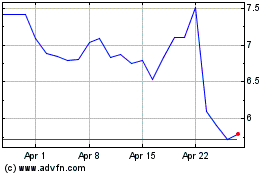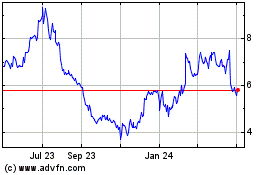U.S. Airlines Face Test as Epidemic Spreads
March 02 2020 - 9:26AM
Dow Jones News
By Alison Sider
U.S. airlines retooled their businesses over the past decade in
ways they said would generate profits even during an economic
shock.
The coronavirus epidemic rippling around the world is providing
the biggest test yet of those efforts.
The biggest operational impact for U.S. carriers has been mass
cancellations into April of flights to and from Asia. American
Airlines Group Inc. and Delta Air Lines Inc. suspended flights to
Milan after the U.S. State Department issued its highest-level
warning against travel there on Saturday.
Now there are mounting signs of softening travel demand in the
U.S., as people skip trips and businesses instruct employees to
stay put. American Airlines, JetBlue Airways Corp. and Alaska Air
Group Inc. have all suspended flight-change and cancellation fees
to accommodate travelers who may be anxious about making firm plans
amid uncertainty about the outbreak.
Pete Erickson, whose company organizes events for big tech
companies, said some employees had backed away from plans to attend
a staff meeting on Monday in Washington DC. "They don't want to get
on a plane -- domestically," Mr. Erickson said. The company decided
not to hold the meeting in-person, and on Sunday told everyone to
stay put.
The financial toll from the epidemic is already expected to far
surpass the $7 billion sales hit to the global airline industry
during the SARS outbreak in 2003. Some analysts have estimated $100
billion in lost revenue to airlines and related industries if
traffic growth that was already slowing turns negative for the
first time in a decade.
"I've never seen anything like this -- it's unprecedented," said
John Grant, an analyst at OAG, which publishes airline schedules
and data.
Hunter Keay at Wolfe Research LLC on Friday cut his 2019 profit
forecast for U.S. airlines by 23% despite a tailwind from lower
fuel prices, which have fallen by a fifth since the start of the
year. U.S. carriers have reported annual profits in each of the
last 10 years -- a record streak for an industry long been
characterized by booms and busts.
The NYSE Arca Airline Index fell 23% last week, outpacing the
broader market's 11.5% decline. Airlines with a lot of debt and
more exposure to international routes have fallen even more. Shares
in American Airlines Group., for instance, dropped 31.5% last week,
making the airline the worst performer in the S&P 500.
United Airlines Holdings Inc., the biggest U.S. carrier on
trans-Pacific routes, has cut back on flying to parts of Asia. The
airline postponed an investor day scheduled in New York this week,
saying discussion of the epidemic would have overwhelmed any other
topics. United is postponing training to bring on some new pilots,
and is offering some of its pilots the option to take April off
with partial pay as a result of its diminished flying to Asia.
Carriers have redeployed wide-body jets from Asian routes into
the domestic market. That could put pressure on fares as they offer
discounts to fill the bigger planes, analysts said.
Airline executives have told investors for years that they have
fortified their businesses against economic downturns by taking
steps like bolstering credit-card partnerships that encourage
customer loyalty and bring in revenue even when consumers cut back
on travel, as well as segmenting their most price-sensitive
customers in basic economy.
Delta Chief Executive Ed Bastian said last year that the airline
has more tools available to manage periods of weak demand, and has
focused on strengthening its balance sheet.
"We spent years doing that in an effort to, as I frequently say,
study for this final exam that is a recession, whenever it might
happen," he said.
Travel-agency ticket sales for domestic trips declined 1.3% in
dollar terms last week from a year ago. That drop wasn't as steep
as the 16% drop for international sales, but it reversed weeks of
annual growth, according to data analyzed by Vertical Research
Partners analyst Darryl Genovesi. Those figures don't include
tickets that airlines sell through their own websites.
Some executives are concerned the epidemic could affect the peak
travel season this summer.
Willie Walsh, CEO of British Airways' parent International
Consolidated Airlines Group SA, said last week that summer bookings
started deviating from expected levels on Feb. 24. Mr. Walsh said
airlines' response to this crisis would differ from the SARS
outbreak and the 2008 recession, when carriers made big capacity
cuts that left them struggling to catch up when demand
returned.
"We're not going to repeat the mistakes we made," he said.
Doug Cameron and Sebastian Herrera contributed to this
article.
Write to Alison Sider at alison.sider@wsj.com
(END) Dow Jones Newswires
March 02, 2020 09:11 ET (14:11 GMT)
Copyright (c) 2020 Dow Jones & Company, Inc.
JetBlue Airways (NASDAQ:JBLU)
Historical Stock Chart
From Mar 2024 to Apr 2024

JetBlue Airways (NASDAQ:JBLU)
Historical Stock Chart
From Apr 2023 to Apr 2024
